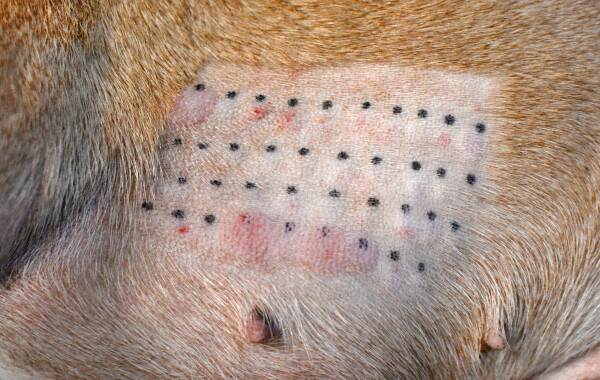Allergy Skin Testing
Allergies are a common and frustrating cause of skin issues in pets, often leading to chronic itching, redness, infections, and discomfort. While many pet owners try various treatments, pinpointing the exact allergen responsible can be difficult without professional testing. Allergy skin testing is a valuable diagnostic tool that helps veterinary dermatologists identify the specific allergens affecting your pet, enabling targeted and effective treatment plans.

What Is Allergy Skin Testing?
Allergy skin testing, also known as intradermal skin testing, is a procedure where small amounts of different allergens are injected just under the skin’s surface. The veterinary dermatologist observes the skin’s reaction to each allergen to determine which ones cause a hypersensitive response.
This testing is considered the gold standard for diagnosing environmental allergies in pets and is much more accurate than blood tests alone. It helps distinguish between true allergens and irritants, which is essential for effective treatment.
Why Is Allergy Skin Testing Important?
Many pets suffer from allergies to pollen, dust mites, molds, fleas, and other environmental factors. Without testing, treatment often focuses only on managing symptoms such as itching and inflammation with medications like steroids or immunomodulators. While these can provide temporary relief, they do not address the underlying cause.
Allergy skin testing allows your veterinarian to:
- Identify the specific allergens causing your pet’s symptoms
- Create a tailored immunotherapy (allergy vaccine) plan
- Reduce reliance on long-term medications
- Improve your pet’s quality of life by targeting the root cause
Accurate diagnosis through skin testing means your pet receives the right treatment, avoiding costly trial-and-error approaches.

Who Should Consider Allergy Skin Testing?
Pets with chronic or recurrent skin problems, especially those who:
- Have persistent itching, scratching, or licking
- Suffer from recurrent ear infections
- Show signs of allergic dermatitis unresponsive to standard treatments
- Have been diagnosed with atopic dermatitis (environmental allergies)
If your pet fits these criteria, allergy skin testing may be recommended by your veterinary dermatologist as part of a comprehensive diagnostic workup.
How Is Allergy Skin Testing Performed?
The testing procedure is typically done under mild sedation or light anesthesia to keep your pet calm and still.
Here’s what to expect:
- Preparation: Your pet’s skin is clipped to expose a patch, usually on the side or abdomen.
- Injection of Allergens: Small amounts of various allergens—including pollens, molds, dust mites, and insect proteins—are injected into the skin.
- Observation: After about 15–20 minutes, the skin is examined for reactions such as redness, swelling, or raised bumps at the injection sites.
- Interpretation: The veterinary dermatologist evaluates the reactions to identify which allergens your pet is sensitive to.
The entire process usually takes less than an hour, and your pet typically recovers quickly from sedation.
What Happens After Allergy Skin Testing?
Once the allergens are identified, your veterinarian can develop a personalized immunotherapy plan, commonly known as “allergy shots.” This treatment involves gradually exposing your pet to increasing amounts of the allergens to build tolerance and reduce allergic reactions over time.
Immunotherapy is a long-term treatment that can significantly decrease symptoms and improve your pet’s comfort, sometimes eliminating the need for ongoing medications like corticosteroids or Apoquel.
Benefits of Allergy Skin Testing and Immunotherapy
- Targeted Treatment: Rather than guessing which allergens are causing problems, treatment is based on precise testing results.
- Reduced Medication Use: Many pets experience reduced dependence on steroids, antihistamines, or other symptom-relieving drugs.
- Improved Quality of Life: Fewer flare-ups mean your pet can enjoy a happier, itch-free life.
- Long-Term Relief: Immunotherapy has the potential to alter the course of allergic disease, offering lasting benefits.
Why Choose a Veterinary Dermatologist for Allergy Skin Testing?
Veterinary dermatologists have specialized training and experience to perform allergy skin testing accurately. They understand the nuances of interpreting test results and can develop comprehensive treatment plans that consider your pet’s unique needs.
Many general practitioners do not perform skin testing themselves or may rely solely on blood tests, which can be less reliable. Choosing a veterinary dermatologist ensures your pet receives the most accurate diagnosis and effective treatment.
Preparing Your Pet for Allergy Skin Testing
Before the test, your pet should avoid antihistamines, steroids, and other allergy medications for a period as directed by your veterinarian to avoid interfering with the results. Your veterinary dermatologist will provide specific instructions based on your pet’s history and current treatment.
Conclusion
Chronic itching and skin problems can greatly affect your pet’s well-being and your peace of mind. Allergy skin testing is a powerful diagnostic tool that takes the guesswork out of managing allergic diseases in pets.
By identifying the exact allergens causing symptoms, your veterinary dermatologist can create a customized treatment plan that targets the source of the problem—improving comfort, reducing medications, and enhancing quality of life.
If your pet suffers from persistent itching, recurring infections, or suspected allergies, consider scheduling an allergy skin test with a veterinary dermatologist. Accurate diagnosis is the first step toward lasting relief.


